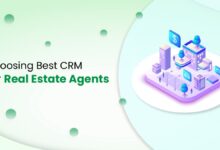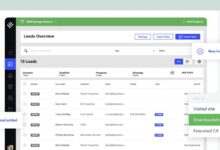Property Management CRM Software: 7 Powerful Tools to Transform Your Business
Managing properties used to mean juggling endless spreadsheets, missed tenant calls, and chaotic communication. But today, property management CRM software is changing the game—bringing order, automation, and real growth to real estate operations.
What Is Property Management CRM Software?

At its core, property management CRM software combines customer relationship management (CRM) capabilities with property management functionalities. It’s not just a digital rolodex—it’s a centralized platform that helps property managers track leads, manage tenant relationships, automate communications, handle maintenance requests, and streamline leasing processes—all from one dashboard.
Core Functions of CRM in Property Management
Unlike generic CRMs, property management CRM software is tailored for real estate workflows. It integrates lead tracking, tenant onboarding, lease management, and communication tools into a single ecosystem. This means no more switching between five different apps to follow up on a rental inquiry or schedule a maintenance check.
- Lead capture and follow-up automation
- Tenant screening and application processing
- Lease creation and digital signing
- Maintenance request tracking
- Automated email and SMS campaigns
These features ensure that no lead falls through the cracks and that tenant satisfaction stays high through timely, personalized interactions.
How It Differs from Traditional Property Management Systems
Traditional property management systems focus on accounting, rent collection, and maintenance logs. While essential, they often lack the marketing and relationship-building tools that CRMs provide. Property management CRM software bridges this gap by adding sales and marketing automation to the mix.
For example, while a standard system might record a tenant’s rent payment, a CRM will also track how that tenant first heard about the property, every interaction they’ve had with the leasing agent, and whether they’re likely to renew their lease based on engagement history.
“A CRM doesn’t just manage tenants—it nurtures relationships that lead to longer leases and higher retention.” — Real Estate Tech Review, 2023
Top 7 Benefits of Using Property Management CRM Software
Adopting property management CRM software isn’t just a tech upgrade—it’s a strategic move that impacts your bottom line, team efficiency, and tenant experience. Let’s explore the seven most compelling benefits.
1. Streamlined Lead Management and Conversion
One of the biggest challenges in property management is converting inquiries into signed leases. With CRM software, every lead—whether from a website form, social media, or a phone call—is automatically logged, scored, and assigned to a leasing agent.
Automated workflows can send instant follow-up emails, schedule tours, and even qualify leads based on predefined criteria (e.g., budget, move-in date). This reduces response time from hours to seconds, significantly increasing conversion rates.
According to a study by NARPM, property managers using CRM tools see up to a 40% increase in lead conversion compared to manual tracking.
2. Enhanced Tenant Communication and Retention
Tenant retention is often more profitable than acquiring new renters. Property management CRM software enables personalized, timely communication through email, SMS, and in-app messaging.
For instance, automated birthday messages, lease renewal reminders, or satisfaction surveys can make tenants feel valued. Some platforms even use AI to analyze tenant sentiment in messages and flag potential issues before they escalate.
Platforms like AppFolio and Buildium offer built-in CRM features that track every tenant interaction, helping managers build stronger relationships.
3. Automated Marketing Campaigns
Marketing doesn’t stop after a tenant moves in. CRM software allows property managers to run targeted campaigns for vacant units, referral programs, or community events.
You can segment your audience—say, tenants in buildings with upcoming renewals—and send personalized offers. Automated drip campaigns nurture cold leads over time, keeping your properties top-of-mind.
For example, a CRM can automatically send a series of emails to a lead who viewed a unit but didn’t schedule a tour, offering a virtual walkthrough or a limited-time application fee waiver.
4. Centralized Data and Document Management
Imagine having every lease agreement, tenant application, maintenance ticket, and communication log in one searchable database. That’s what property management CRM software delivers.
No more digging through email threads or shared drives. Documents are tagged, stored securely, and accessible from any device. Role-based permissions ensure that only authorized staff can view sensitive information.
This centralization reduces errors, speeds up onboarding, and makes audits or inspections far less stressful.
5. Improved Maintenance Coordination
Maintenance requests are a major pain point for both tenants and managers. A CRM-integrated system allows tenants to submit requests via a portal or app, which are then automatically routed to the appropriate vendor or maintenance team.
Managers can track request status in real time, set priority levels, and even automate follow-ups to ensure issues are resolved promptly. Some systems integrate with IoT devices to predict maintenance needs before they become emergencies.
For example, Entrata offers a resident portal where tenants can report issues, upload photos, and receive updates—all within the CRM ecosystem.
property management crm software – Property management crm software menjadi aspek penting yang dibahas di sini.
6. Data-Driven Decision Making
CRMs generate detailed reports on lead sources, conversion rates, tenant turnover, and marketing ROI. This data helps property managers identify what’s working and where to improve.
For instance, if most high-quality leads come from Facebook ads, you can allocate more budget there. If a particular property has a high vacancy rate despite heavy marketing, the CRM data might reveal that follow-up response times are too slow.
Advanced analytics can even predict churn risk—flagging tenants who haven’t paid on time or haven’t engaged with communications—allowing proactive retention efforts.
7. Scalability for Growing Portfolios
Whether you manage 10 units or 1,000, property management CRM software scales with your business. Automation reduces the need for additional staff as your portfolio grows.
Multi-property owners can manage all locations from a single dashboard, apply consistent branding, and maintain uniform communication standards. Franchise operators or property management firms can grant regional managers access while maintaining corporate oversight.
Cloud-based systems ensure that your team can work remotely, access data on the go, and collaborate seamlessly across locations.
Key Features to Look for in Property Management CRM Software
Not all CRM systems are created equal. When evaluating property management CRM software, focus on features that align with your business model, team size, and growth goals.
Lead Capture and Tracking
The best CRMs offer multiple lead capture methods: website forms, SMS keywords, QR codes on signage, and integrations with listing sites like Zillow or Apartments.com.
Look for systems that automatically assign lead scores based on behavior (e.g., visiting the pricing page multiple times) and route high-intent leads to top agents.
Some platforms, like Quotit, specialize in aggregating leads from multiple sources and deduplicating them to avoid conflicts.
Automated Workflows and Drip Campaigns
Automation is the backbone of efficient CRM use. You should be able to set up workflows that trigger actions based on user behavior.
For example:
– If a lead schedules a tour → send a confirmation email + calendar invite + neighborhood guide.
– If a tenant’s lease expires in 60 days → trigger a renewal offer + schedule a check-in call.
– If a maintenance request is unresolved after 48 hours → notify the manager and escalate to a supervisor.
These workflows save hours of manual work and ensure consistency in service delivery.
Integration with Property Management Systems
Your CRM should integrate seamlessly with your existing property management system (PMS), accounting software, and communication tools.
Common integrations include:
– QuickBooks for financial data
– Slack or Microsoft Teams for internal alerts
– Zapier for connecting to 3,000+ other apps
– SMS gateways like Twilio for text messaging
Without smooth integration, you risk data silos and double data entry, which defeats the purpose of using a CRM.
Top 5 Property Management CRM Software Platforms in 2024
With so many options on the market, choosing the right property management CRM software can be overwhelming. Here’s a breakdown of the top five platforms based on features, user reviews, and scalability.
1. Buildium
Buildium is a favorite among small to mid-sized property management companies. Its CRM features include lead tracking, email automation, and a resident portal.
Key strengths:
– Intuitive interface
– Strong marketing automation
– Mobile app for on-the-go management
– Integrates with Zillow, HotPads, and Facebook
Buildium’s CRM is particularly effective for single-family home managers who need a balance of simplicity and functionality. Learn more at buildium.com.
2. AppFolio
AppFolio offers a robust CRM built into its all-in-one property management platform. It’s ideal for larger portfolios and multifamily operators.
Standout features:
– AI-powered lead scoring
– Automated SMS and email campaigns
– Advanced reporting and analytics
– Built-in online leasing
property management crm software – Property management crm software menjadi aspek penting yang dibahas di sini.
AppFolio’s system learns from your data to recommend optimal follow-up times and messaging. It’s used by over 30,000 properties nationwide. Visit appfolio.com for a demo.
3. Entrata
Entrata is a premium solution designed for large multifamily communities and enterprise-level operators.
What sets it apart:
– Unified platform for leasing, accounting, and CRM
– Voice and chatbot assistants for 24/7 lead engagement
– Predictive analytics for occupancy and revenue
– Full resident lifecycle management
Entrata’s CRM is deeply integrated with its marketing and leasing tools, making it a powerhouse for high-volume operations. Explore it at entrata.com.
4. Rent Manager
Developed by Propertyware, Rent Manager is a desktop-based solution with strong CRM capabilities for commercial and residential managers.
Key advantages:
– Highly customizable workflows
– Advanced document management
– Offline access (rare in cloud-based systems)
– Strong support for hybrid (remote + office) teams
While it has a steeper learning curve, Rent Manager offers unmatched control for complex portfolios. Check it out at rentmanager.com.
5. MRI Software
MRI is a global leader in real estate software, offering a comprehensive CRM module within its enterprise-grade platform.
Best for:
– Large property management firms
– Institutional investors
– Mixed-use developments
MRI’s CRM includes AI-driven insights, global compliance tools, and deep integration with accounting and asset management systems. It’s not for beginners, but it’s powerful for scaling businesses. Learn more at mrisoftware.com.
How to Implement Property Management CRM Software Successfully
Choosing the right software is only half the battle. Successful implementation requires planning, training, and ongoing optimization.
Assess Your Current Workflow
Before adopting any CRM, map out your current processes: How do you capture leads? How long does it take to respond? What tools do your team use?
Identify bottlenecks—like delayed follow-ups or lost applications—and define how the CRM will solve them. This helps set clear goals and measure ROI after implementation.
Train Your Team Thoroughly
Even the best CRM will fail if your team doesn’t use it consistently. Provide hands-on training, create standard operating procedures (SOPs), and assign a CRM champion within your team.
Consider starting with a pilot group—like your leasing agents—before rolling it out company-wide. Gather feedback and adjust workflows as needed.
Migrate Data Carefully
Transferring existing tenant and lead data into the new CRM is critical. Clean your data first—remove duplicates, update contact info, and standardize formats.
Most CRM providers offer migration services or tools. Use them. Rushing this step can lead to corrupted data and lost relationships.
Common Challenges and How to Overcome Them
While property management CRM software offers huge benefits, adoption isn’t always smooth. Here are common challenges and how to address them.
Resistance to Change
Team members may resist switching from familiar tools to a new system. Combat this by involving them early, showing how the CRM reduces their workload, and celebrating quick wins.
For example, if a leasing agent closes a deal faster thanks to automated follow-ups, highlight that success in team meetings.
Data Overload
CRMs can generate a lot of data. Without clear reporting goals, you might end up drowning in metrics that don’t matter.
Solution: Focus on KPIs that align with your business goals—like lead conversion rate, average lease signing time, or tenant satisfaction score. Use dashboards to visualize only the most important data.
property management crm software – Property management crm software menjadi aspek penting yang dibahas di sini.
Integration Issues
If your CRM doesn’t talk to your accounting or maintenance software, you’ll waste time switching apps and re-entering data.
Always test integrations before committing. Ask vendors for case studies or references from similar-sized companies. Use middleware like Zapier if native integrations are lacking.
Future Trends in Property Management CRM Software
The CRM landscape is evolving fast. Staying ahead of trends ensures your business remains competitive and efficient.
AI and Predictive Analytics
Future CRMs will use AI not just to automate tasks, but to predict outcomes. Imagine a system that tells you which leads are most likely to lease, which tenants might break their lease, or when a property will go vacant.
AI-powered chatbots will handle initial inquiries 24/7, qualifying leads and scheduling tours without human intervention.
Mobile-First and Voice-Activated Interfaces
As more property managers work remotely, mobile CRM access is no longer optional. Expect more platforms to offer voice-activated commands—like “Log a maintenance request for Unit 304” via smart speakers or phone apps.
Resident portals will become more app-like, with push notifications and in-app messaging replacing emails.
Enhanced Security and Compliance
With increasing data privacy laws (like GDPR and CCPA), CRMs will need stronger encryption, audit trails, and consent management tools.
Expect features like two-factor authentication, role-based access, and automatic data deletion for expired leads to become standard.
What is property management CRM software?
Property management CRM software is a specialized platform that combines customer relationship management tools with property management functions. It helps track leads, manage tenant interactions, automate marketing, and streamline operations like leasing and maintenance—all from one system.
How does CRM software improve tenant retention?
By enabling personalized communication, automated renewal reminders, satisfaction surveys, and quick response to maintenance requests, CRM software helps build stronger tenant relationships, leading to higher satisfaction and longer lease durations.
Can small property management companies benefit from CRM software?
Absolutely. Even small firms can benefit from automation, better lead tracking, and improved communication. Many CRM platforms offer scalable pricing, making them accessible for businesses managing just a few units.
Is property management CRM software expensive?
Costs vary based on features and company size. Some platforms start at around $50/month for basic plans, while enterprise solutions can cost thousands per month. However, the ROI in time savings and increased conversions often justifies the investment.
How long does it take to implement a CRM system?
Implementation can take anywhere from a few days to several weeks, depending on the complexity of your operations and the amount of data to migrate. Proper planning and training can speed up the process and ensure smoother adoption.
Property management CRM software is no longer a luxury—it’s a necessity for any serious property manager looking to stay competitive, scale efficiently, and deliver exceptional tenant experiences. From automating mundane tasks to unlocking powerful insights, the right CRM can transform how you run your business. The key is choosing a platform that fits your needs, training your team effectively, and using the data to make smarter decisions. As technology continues to evolve, embracing these tools today positions you for long-term success in an increasingly digital real estate landscape.
property management crm software – Property management crm software menjadi aspek penting yang dibahas di sini.
Further Reading:


